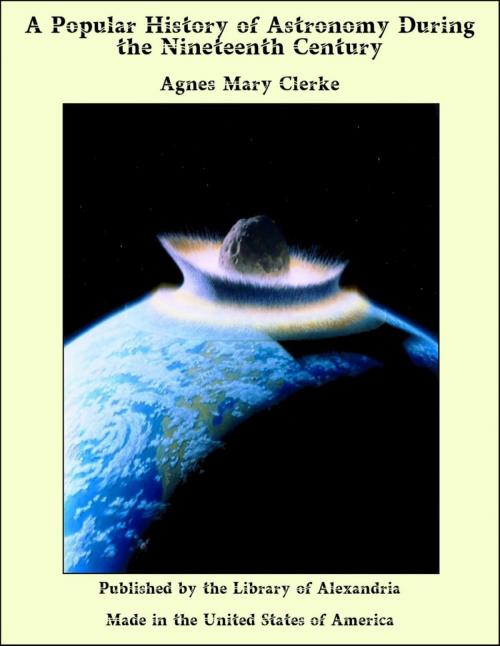A Popular History of Astronomy During the Nineteenth Century
Nonfiction, Religion & Spirituality, New Age, History, Fiction & Literature| Author: | Agnes Mary Clerke | ISBN: | 9781465556752 |
| Publisher: | Library of Alexandria | Publication: | July 29, 2009 |
| Imprint: | Library of Alexandria | Language: | English |
| Author: | Agnes Mary Clerke |
| ISBN: | 9781465556752 |
| Publisher: | Library of Alexandria |
| Publication: | July 29, 2009 |
| Imprint: | Library of Alexandria |
| Language: | English |
TO THE FIRST EDITION The progress of astronomy during the last hundred years has been rapid and extraordinary. In its distinctive features, moreover, the nature of that progress has been such as to lend itself with facility to untechnical treatment. To this circumstance the present volume owes its origin. It embodies an attempt to enable the ordinary reader to follow, with intelligent interest, the course of modern astronomical inquiries, and to realize (so far as it can at present be realized) the full effect of the comprehensive change in the whole aspect, purposes, and methods of celestial science introduced by the momentous discovery of spectrum analysis. Since Professor Grant's invaluable work on the History of Physical Astronomy was published, a third of a century has elapsed. During the interval a so-called "new astronomy" has grown up by the side of the old. One effect of its advent has been to render the science of the heavenly bodies more popular, both in its needs and in its nature, than formerly. More popular in its needs, since its progress now primarily depends upon the interest in, and consequent efforts towards its advancement of the general public; more popular in its nature, because the kind of knowledge it now chiefly tends to accumulate is more easily intelligible—less remote from ordinary experience—than that evolved by the aid of the calculus from materials collected by the use of the transit-instrument and chronograph. It has thus become practicable to describe in simple language the most essential parts of recent astronomical discoveries, and, being practicable, it could not be otherwise than desirable to do so. The service to astronomy itself would be not inconsiderable of enlisting wider sympathies on its behalf, while to help one single mind towards a fuller understanding of the manifold works which have in all ages irresistibly spoken to man of the glory of God might well be an object of no ignoble ambition. The present volume does not profess to be a complete or exhaustive history of astronomy during the period covered by it. Its design is to present a view of the progress of celestial science, on its most characteristic side, since the time of Herschel. Abstruse mathematical theories, unless in some of their more striking results, are excluded from consideration. These, during the eighteenth century, constituted the sum and substance of astronomy, and their fundamental importance can never be diminished, and should never be ignored. But as the outcome of the enormous development given to the powers of the telescope in recent times, together with the swift advance of physical science, and the inclusion, by means of the spectroscope, of the heavenly bodies within the domain of its inquiries, much knowledge has been acquired regarding the nature and condition of those bodies, forming, it might be said, a science apart, and disembarrassed from immediate dependence upon intricate, and, except to the initiated, unintelligible formulæ. This kind of knowledge forms the main subject of now offered to the public
TO THE FIRST EDITION The progress of astronomy during the last hundred years has been rapid and extraordinary. In its distinctive features, moreover, the nature of that progress has been such as to lend itself with facility to untechnical treatment. To this circumstance the present volume owes its origin. It embodies an attempt to enable the ordinary reader to follow, with intelligent interest, the course of modern astronomical inquiries, and to realize (so far as it can at present be realized) the full effect of the comprehensive change in the whole aspect, purposes, and methods of celestial science introduced by the momentous discovery of spectrum analysis. Since Professor Grant's invaluable work on the History of Physical Astronomy was published, a third of a century has elapsed. During the interval a so-called "new astronomy" has grown up by the side of the old. One effect of its advent has been to render the science of the heavenly bodies more popular, both in its needs and in its nature, than formerly. More popular in its needs, since its progress now primarily depends upon the interest in, and consequent efforts towards its advancement of the general public; more popular in its nature, because the kind of knowledge it now chiefly tends to accumulate is more easily intelligible—less remote from ordinary experience—than that evolved by the aid of the calculus from materials collected by the use of the transit-instrument and chronograph. It has thus become practicable to describe in simple language the most essential parts of recent astronomical discoveries, and, being practicable, it could not be otherwise than desirable to do so. The service to astronomy itself would be not inconsiderable of enlisting wider sympathies on its behalf, while to help one single mind towards a fuller understanding of the manifold works which have in all ages irresistibly spoken to man of the glory of God might well be an object of no ignoble ambition. The present volume does not profess to be a complete or exhaustive history of astronomy during the period covered by it. Its design is to present a view of the progress of celestial science, on its most characteristic side, since the time of Herschel. Abstruse mathematical theories, unless in some of their more striking results, are excluded from consideration. These, during the eighteenth century, constituted the sum and substance of astronomy, and their fundamental importance can never be diminished, and should never be ignored. But as the outcome of the enormous development given to the powers of the telescope in recent times, together with the swift advance of physical science, and the inclusion, by means of the spectroscope, of the heavenly bodies within the domain of its inquiries, much knowledge has been acquired regarding the nature and condition of those bodies, forming, it might be said, a science apart, and disembarrassed from immediate dependence upon intricate, and, except to the initiated, unintelligible formulæ. This kind of knowledge forms the main subject of now offered to the public















